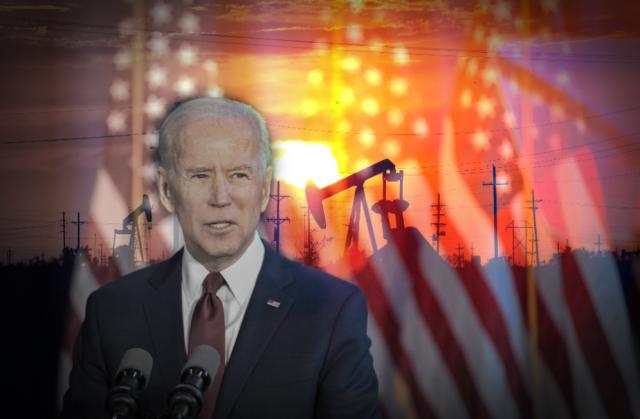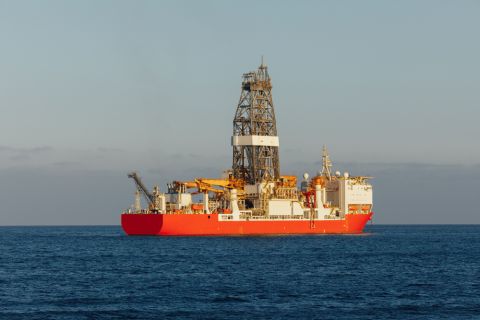
The sun sets on the Permian Basin: lawmakers in Texas fear Biden’s early executive orders on climate are harbingers of worse things to come for oil and gas. (Source: Photo of Joe Biden by Ron Adar / Shutterstock.com; Permian pump jack by Hart Energy)
U.S. President Joe Biden’s moratorium on drilling on federal lands has prompted lawmakers within his own party to warn that the policy threatens jobs and local budgets in states dependent on fossil fuels.
The opposition in states such as Texas and New Mexico presages what is likely to be a big issue in the 2022 midterm elections, where Democrats will have to defend or contest seats in moderate congressional districts that rely on oil and gas.
It is also an early test of the Biden administration’s ability to square the demands of moderate Democrats, on whom it depends for its slim majority in the House and Senate, with those of progressives who want quick action on climate change.
In his first week in office, Biden ordered the suspension of leases for fossil fuel development on federal lands and offshore waters, and a “rigorous review” of leasing and permitting practices. He also created a civilian “climate corps,” directed federal agencies to procure American-made zero-emissions vehicles for their fleets, and scrapped a permit for the Keystone XL oil pipeline. Biden asked Congress to eliminate fossil fuel subsidies.
While the initiatives pleased environmentalists, they worried Democratic members of Congress from around the Permian Basin, the world’s most prolific oilfield, in western Texas and southeastern New Mexico.
Four Democratic House members from Texas wrote to the new president declaring: “Now is not the time to jeopardize American jobs, or the critical tax and royalty revenues that federal leases generate for local, state, and federal government that need funds now.”
Vicente González, who was re-elected in his western Texas district by a narrow margin last year, warned that the executive order would “hurt an already suffering community.”
On Feb. 4, New Mexico’s two Democratic senators, along with the Democratic senators of Colorado, Pennsylvania, West Virginia and Montana, joined Republican senators to vote 57-43 for an amendment to block any new regulations from the White House or Environmental Protection Agency to ban fracking, something Biden has insisted he has no intention of doing.
A permanent suspension of new oil and gas leasing on federal lands would hit New Mexico particularly hard, local officials and industry representatives say. The state has gone from producing 60 million to 300 million barrels of oil a year in the past decade, and more than 50% of the state’s oil production comes from federal lands. Across the U.S., federal lands and waters account for just 25% of total U.S. oil production.
“The question looming over our state right now is how will we be able to manage the state’s resources moving forward so that we have adequate funding for schools and for state budgets and other critical means,” said Robert McEntyre, director of communications for the New Mexico Oil and Gas Association.
“Oil and gas provides about a third of the budget for our state—last year that was $2.8 billion. There is no silver bullet or silver check that is coming to replace those funds.”
Texas will not face the same repercussions as New Mexico, given that the vast majority of the state’s oil industry is concentrated on private land. But there is still concern that Biden’s executive orders are a “harbinger for things to come” for the oil and gas industry more broadly, including tougher regulation, said Mark Jones, a political science professor at Rice University.
The pushback shows the difficulties Biden will face in fulfilling his campaign vow to shift the country away from fossil fuels in a divided Washington. It comes as the president contemplates bypassing Republicans to pass additional stimulus spending during the pandemic.
“Biden is determined to legislate wherever he can with Republicans,” said Paul Bledsoe, a climate adviser to Bill Clinton’s White House, now with the Progressive Policy Institute.
“Unfortunately the current COVID stimulus [negotiations] suggest a more partisan approach. The Republicans may attack the regulatory agenda and may not help with the legislative agenda.”
Biden has named the climate crisis as one of four priorities during his first months in office alongside COVID-19, the economic recovery and racial justice. The administration argues that all four are interrelated and have to be tackled together.
“The Biden administration is walking into a situation where it is facing multiple crises all at the same time…This is a Rubik’s Cube of getting multiple goals aligned,” said Elizabeth Gore, senior vice-president of political affairs at the Environmental Defense Fund.
However, many Democrats realized that they were hurt during the 2020 election campaign by Biden’s declaration during a presidential debate that he would shift the US away from oil and gas.
He later clarified that the U.S. would move away from federal subsidies for oil and gas rather than from the industry itself. But the comment damaged Democrats in Texas. Donald Trump easily won the Republican-leaning state and Democrats only won one of the eight state Senate seats they were hoping to flip.* In oil and gas-producing New Mexico and Oklahoma, Democrats lost two crucial U.S. House of Representatives seats.
“The fear for Democrats is that you’re going to lose votes of people who might otherwise vote Democratic,” Jones said. “But because of what they see as an attack on their livelihoods…some of them might start to think Democrats are bad for their pocketbooks.”
*This story has been amended to reflect the fact that Democrats were hoping to flip eight state Senate seats in Texas.
Recommended Reading
TotalEnergies Starts Production at Akpo West Offshore Nigeria
2024-02-07 - Subsea tieback expected to add 14,000 bbl/d of condensate by mid-year, and up to 4 MMcm/d of gas by 2028.
Tech Trends: SLB's Autonomous Tech Used for Drilling Operations
2024-02-06 - SLB says autonomous drilling operations increased ROP at a deepwater field offshore Brazil by 60% over the course of a five-well program.
Seadrill Awarded $97.5 Million in Drillship Contracts
2024-01-30 - Seadrill will also resume management services for its West Auriga drillship earlier than anticipated.
Well Logging Could Get a Makeover
2024-02-27 - Aramco’s KASHF robot, expected to deploy in 2025, will be able to operate in both vertical and horizontal segments of wellbores.
Remotely Controlled Well Completion Carried Out at SNEPCo’s Bonga Field
2024-02-27 - Optime Subsea, which supplied the operation’s remotely operated controls system, says its technology reduces equipment from transportation lists and reduces operation time.





